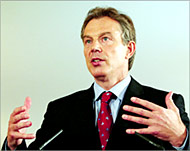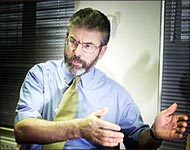Blair puts off N.Ireland elections
Not satisfied with the IRA’s refusal to giving up armed resistance, the British Prime Minister Tony Blair has postponed elections scheduled for later this month
British prime minister Tony Blair on Thursday postponed a key election in Northern Ireland for a second time, blaming the Irish Republican Army for failing to make a clear commitment to peace.
Blair said he was forced into delaying the poll until the autumn by the IRA’s refusal to expressly rule out all paramilitary activities.
“Will those activities continue to be authorised or not by the IRA – yes or no?” Blair said. “We are at the point where people have got to go to the absolute definitive, completed position of forswearing violence in all its forms.”
 |
|
Blair: no elections until |
The scheduled 29 May election to the assembly, through which power is shared by Protestants and Catholics, had already been delayed once after an original 1 May 1 was put back.
It cannot be rescheduled sooner than autumn because of the approaching summer “marching season”, when traditional parades by Protestants heighten sectarian tensions in the province.
Protestant parties are objecting to the participation in government of Sinn Fein, a Catholic party which is the IRA’s political ally, until the group declares its war against British rule over and vows to embrace only peaceful means.
The election delay dashes hopes of quickly rebuilding political consensus in Northern Ireland after the assembly was suspended last year amid allegations of IRA spying.
Blair, who has been focussing heavily on Northern Ireland since the end of the Iraq war, said he could not guarantee there would not be a further delay to the election although it was his “desire and intention” to hold a poll in the autumn.
But it was unfeasible to hold an election this month to a currently suspended assembly, he argued. The assembly is the centrepiece of power-sharing set up under Northern Ireland’s landmark 1998 Good Friday accord, which largely ended three decades of sectarian conflict.
Speaking just before Blair, his Northern Ireland Secretary Paul Murphy listed the activities he said the IRA needed to specifically rule out – military attacks, training, targetting, intelligence-gathering, acquisition or development of arms, preparation for “terrorist campaigns”, punishment beatings and attacks, and involvement in riots.
“We believe there remains lack of clarity on the crucial issue of whether the IRA is prepared for a full, immediate and permanent cessation of all paramilitary activity,” he said.
 |
|
Adams: calls for protests |
Sinn Fein leader Gerry Adams accused London of hijacking the election, called for protests on May 29 and said he had answered Blair’s questions about clarity in ending paramilitary activity.
“Rather than today moving the peace process forward it has in many ways compounded the difficulties,” Adams told a Belfast news conference.
Irish Prime Minister Bertie Ahern, who has been negotiating alongside Blair in a joint effort to keep the elections on course, broke ranks with London to oppose the delay.
“Ultimately, I believe that yet another postponement causes more problems for the (peace) process than it solves,” Ahern told reporters in Dublin, without elaborating. Blair and Ahern will meet in Dublin on Tuesday.
But support for Blair came from the province’s main Protestant leader, David Trimble. “To have an election to something that doesn’t exist (would be) treating the electorate with contempt,” the Ulster Unionist Party chief said.
Peter Robinson, deputy leader of Northern Ireland’s hardline Protestant party, the Democratic Unionist Party (DUP), accused Blair, however, of behaving like “a petty third world dictator”. The DUP, led by firebrand preacher Ian Paisley, had been hoping to overtake Trimble’s more centrist Ulster Unionists as the largest party among Protestant voters.
“With his decision to deny a democratic election to the people of Northern Ireland, Tony Blair has added his name to the international list of shame of those leaders who have abandoned democratic elections,” he said.